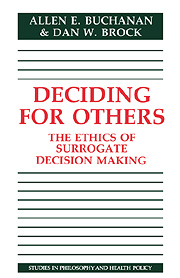Book contents
Chapter 6 - The elderly
Published online by Cambridge University Press: 05 June 2012
Summary
This chapter describes and explains in greater detail both formal and informal practices of decision making for incompetent and questionably competent elderly people, and the institutional and legal framework within which these practices occur. Its purpose is not restricted to description and explanation, however. Current practices are evaluated by applying the analysis of competence set out in Chapter 1 and the primary ethical framework developed in Chapter 2.
THE MAGNITUDE OF THE PROBLEM
The issue of decision making for incompetent or questionably competent elderly people touches us all – as individuals who have or will have friends or family members who are elderly and incompetent, as persons who are ourselves likely to be in this situation at some point during our last years, and as concerned citizens.
Incompetence may be limited or complete, chronic or intermittent, and it may be due to one or more of a diverse group of medical disorders (although for most of these disorders, only some, not all, persons afflicted with them are incompetent), including: (1) degenerative neurological disorders such as Alzheimer's disease and Parkinson's disease, (2) single or multiple cerebrovascular accidents (stroke), (3) severe acute or chronic depression that impairs cognitive function, (4) temporary or permanent coma, (5) mental retardation, (6) psychosis, or (7) severe personality disorders.
- Type
- Chapter
- Information
- Deciding for OthersThe Ethics of Surrogate Decision Making, pp. 267 - 310Publisher: Cambridge University PressPrint publication year: 1990

